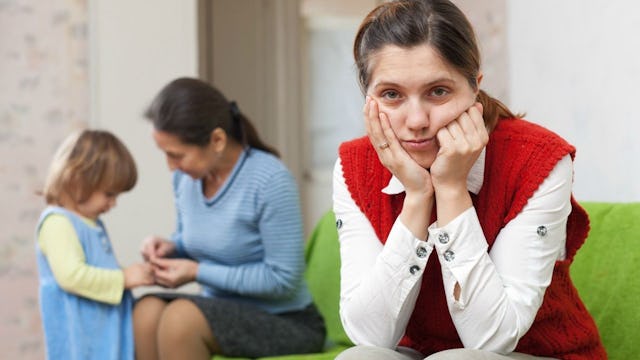My In-Laws Are Toxic, But I'm Struggling To Cut Them Off

My mantra has always been “it’s family” and “family first.” No matter what happens in life, if it’s family, it just is. But when do you draw the line where “they are family” is no longer an excuse to keep someone in your life? What is that breaking point?
My husband left his house at 18, like most teens. But he didn’t leave for college, to travel, or for a job — he left to get away from his parents. With two self-absorbed, alcoholic parents, one who nearly killed him during a drunken rage, he knew the only way to survive was to move to another country and make it on his own.
When I met him, he was fending for himself, spending a few weeks out of the year with his parents — the most he could handle. We had a whirlwind romance, love at first sight. After six months, we were engaged and had a quick, secret elopement while planning a big wedding.
From the minute we announced our engagement, his parents began to show their true colors of mass destruction by shutting him out for months on end and telling him they disowned him for wanting to marry an American. By marrying me, they knew he would never truly come home.
Thirteen years later, we’ve spent year after year dreading their annual visit. They are family, after all–they want to come see us. But the more years that go by, the more it seems they are not coming for us but to go on a vacation while using our home. We’ve got a pool, we’re not too far from the beach, and my husband cooks wonderful meals. It is a vacation home, but it’s still our home.
When the call comes for them to book dates, we die a little inside. Our only vacation time off work is to entertain them at our home. I have no problem with houseguests. I love to spoil folks at our home. We are terrific hosts, but I feel they take advantage. Every morning they come down and sit to be waited on for their tea and coffee. Each day we have to go back to the liquor store to refill the wine and alcohol consumed the day before. Every week we do laundry and clean up messes that come with adults who drink day in and out.
That’s not all. We have children. Our two kids love their grandparents and don’t know any better. When they act totally inappropriate, our kids giggle with delight and we look like the bad guys when we tell them it’s time to go to bed.
When the grandparents are out of control and falling with serious injuries, we are the ones cleaning up the blood and the kids are watching worried, going to bed with nightmares. By the end of one week, my husband cowers in our room just counting the days and minutes even until they leave. He dreads the arguments that ensue, is sad his kids have to see this, and is broken from living a life with parents who care only for themselves.
There are arguments, screaming, bad words, and the silent treatment. There are very awkward moments, indecent exposure, and total impatience. It seems that they couldn’t care less about the kids, telling them to shut up, calling my daughter a stupid girl, and rolling eyes whenever we go to the kids’ activities.
But on the other side, there are endless hours of play in the kids’ rooms, squeals of delight as they learn about their dad’s culture, and goodies brought over for everyone. They aren’t horrible people all the time. When they aren’t drinking, we can almost have fun.
We try to take the bad with the good, but each year the bad heavily outweighs the good.
Talking about it is out of the question — we are to blame.
Cutting them off is extreme — it will be our issue.
Asking them to stay in a hotel — that will start World War III.
They want to come to our home once a year to “vacation” and see their grandchildren. I would never want to take that away from them or my kids. When do we stop making excuses and cut them off? It’s not healthy for us or for our kids to see them the way they act. They will never change. We have accepted that. Every year for their rest of their lives, they will come to our house, drink until they pass out almost every day, and treat our home like their own B&B. Unless we make a change. What do we do?
They are family after all. But is that enough?
This article was originally published on